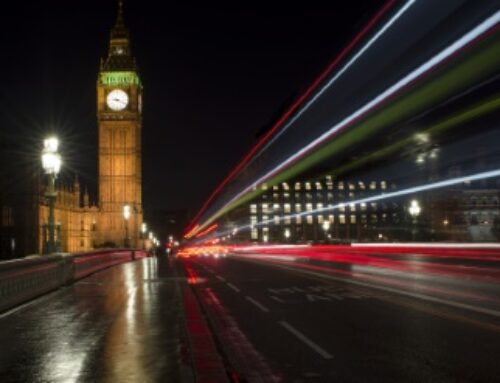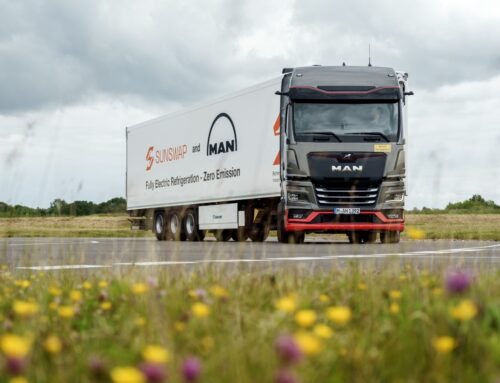Convey and SM UK in DVS compliance warning
 With the deadline for changes to Transport for London’s Direct Vision Standard (DVS) regulations rapidly approaching, compliance specialist Convey Technology last week hosted a special webinar to outline some of the challenges facing affected fleets.
With the deadline for changes to Transport for London’s Direct Vision Standard (DVS) regulations rapidly approaching, compliance specialist Convey Technology last week hosted a special webinar to outline some of the challenges facing affected fleets.
From 28 October 2024, heavy goods vehicles over 12 tonnes operating in Greater London will either need to meet the threshold for a three-star rating or higher under DVS – which measures the level of direct vision drivers have from the cab of individual vehicle models – or fit safety equipment in line with the new Progressive Safe System (PSS), to avoid penalty charges of up to £550 per day.
Addressing webinar delegates was Ed Barrie, business development manager at SM UK, a major installer of Brigade DVS equipment. SM UK has urged operators of vehicles that will fall short of the three-star DVS rating to book PSS equipment installation slots now to avoid missing the deadline – and to carefully check that they have bought or are buying fully compliant kit.
With 165,000 vehicles estimated to require an equipment retrofit prior to the deadline, Mr Barrie warned that SM UK was not currently seeing the requisite numbers of installation bookings coming through.
He predicted a bottleneck scenario similar to the introduction of the first phase of DVS in 2020, when the company was still fitting systems “four or five months after the deadline had passed”. This had meant operators could either no longer work in London while awaiting installations, or had to pay fines in order to do so.
“Because there are a limited number of engineers, the longer that operators leave the decision to get this planned in… the bigger the bottleneck that’s going to happen,” he warned.
Mr Barrie acknowledged that Transport for London (TfL) was set to offer a grace period up until the end of January 2025 – with the possibility of a further extension to this yet to be announced – but this was contingent on operators being able to demonstrate to TfL’s satisfaction that arrangements were in place to install equipment.
Full information on the forthcoming equipment requirements for PSS can be found at the TfL website – but among them is the need for a moving off information system (MOIS) fitted to the front of the vehicle, to warn the driver of vulnerable road users (VRUs) and prevent collisions in the front blind spot zone when a vehicle moves off from rest.
Ed Barrie said that the relatively late announcement of the finer details of the MOIS specification was part of the reason some of the systems available on the market are not compliant.
“It’s really important that you as operators understand what the differences are and what to ask, because the onus will be on you at the end of the day should anything fail,” he said.
Another element of the PSS is the blind spot information system (BSIS). Designed to prevent left turn collisions, this must ensure full coverage down the nearside of rigid vehicles to detect VRUs, and must not activate in relation to roadside furniture or stationary vehicles.
Mr Barrie noted that PSS systems being advertised as compliant with UN regulations 159 and 151, for MOIS and BSIS respectively, were not necessarily compliant with DVS requirements for retrofit to existing vehicles. SM UK was urging operators to complete due diligence to ensure that any system they purchased was fully compliant with the DVS specifications.
Operators applying for London safety permits would need to provide a sensor functionality statement from their equipment manufacturer, to confirm the product had passed relevant tests.
But he warned that TfL was allowing system manufacturers to self-certify their products’ compliance, and that SM UK had found evidence of non-compliant technology whose suppliers had nonetheless self-certified to the contrary.

As part of the webinar presentation, SM UK demonstrated how PSS technology could be tested to determine compliance
He urged operators to double-check and ask for evidence that systems had passed appropriate tests, rather than relying on self-certification alone. They should request independent verification of compliance with DVS 2024, he advised.
He also said that when engaging with equipment providers, operators should ask whether products carry the ‘E’ mark and REG10 (electromagnetic compatibility) certification, and to ask for proof.
Operators applying for permits would also need a statement from the engineer who fitted the equipment, said Mr Barrie, stating that the technology was in good working order and fitted in compliance with specifications. He added that even an otherwise compliant system, if fitted incorrectly, would be deemed non-compliant.
He advised that operators should ask whether installers have SafeContractor certification or similar, and again to ask for proof.
Prior to the webinar, Ed Barrie said: “We are most worried that some operators may be buying and installing DVS systems that may fall foul of the new DVS requirements, even though some manufacturers appear to be telling them that they are compliant..
“Currently TfL have allowed manufacturers to self-certify their systems as compliant, but in preliminary testing we found that some systems failed to meet the specifications.”
This could put operators in an extremely vulnerable situation, Convey Technology warned, since those believing they have a valid safety permit could actually be operating non-compliant vehicles.
Mr Barrie added: “We were so troubled by the decision to allow self-certification by manufacturers that we asked TfL to consider independent testing.”
According to Convey, TfL has told SM UK in writing that if a manufacturer’s equipment is found to be non-compliant they will immediately terminate the permits of any operator using that manufacturer’s kit. This will be possible, says the firm, because of the requirement in the application process for the operator to provide a statement of functionality and compliance from the manufacturer, and a statement from the engineer who did the installation.
Convey’s Karen Crispe, who hosted the webinar, added: “We see this situation as very alarming. Operators who think they have followed all the correct processes could be prevented from working in London overnight and they will have had no idea that they were not compliant.”
Readers who missed the webinar on 21 May can view a live replay here.










